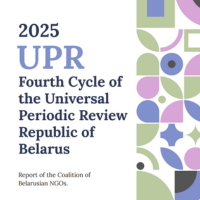
A coalition of Belarusian NGOs has submitted a joint report on Belarus’s fulfillment of its human rights obligations under the fourth cycle of the UPR.
The report was prepared by:
-
Belarusian Association of Human Rights Lawyers
-
Belarusian Association of Journalists
-
Belarusian Congress of Democratic Trade Unions
-
Belarusian Helsinki Committee
-
Belarusian PEN
-
Coalition of Civil Society Organizations, Initiatives and Activists against Gender-based and Domestic Violence
-
Human Constanta
-
Human Rights Center "Viasna"
-
Lawtrend
-
Legal Initiative
-
Medical Solidarity Fund (BYMEDSOL)
-
Office for the Rights of Persons with Disabilities
-
Respect-Protect-Fulfill.
The overall coordination of the report’s preparation was carried out by the Belarusian Helsinki Committee.
What is the UPR and why does it matter?
Every 4.5 years, each UN member state undergoes the Universal Periodic Review, a kind of "exam" where it reports on its human rights situation. Other countries make recommendations to the reporting country on what needs to be improved.
The country under review then voluntarily decides which of the recommendations it accepts. It is assumed that the country accepts and implements the recommendations voluntarily because it will make people's lives better. And since the review is periodic (every 4.5 years), there is an opportunity to see how the country has implemented the recommendations.
Belarus underwent the UPR procedure in 2010, 2015 and 2020.
Find out more about the Universal Periodic Review (UPR) process and the role of NGOs in it here.
Report by a Coalition of Belarusian NGOs
In their report, the coalition of Belarusian NGOs presented the overall human rights situation in the country and offered recommendations that could be usefully addressed to the Belarusian authorities within the framework of the UPR process.
Among the priority areas:
-
Equality and non-discrimination: Adopt comprehensive anti-discrimination legislation.
-
Right to life, liberty, and security of person: Unconditionally release all political prisoners and stop the practice of arbitrary detention. Stop incommunicado detention and ensure timely access to legal and medical assistance, as well as contact with relatives. Establish a moratorium on the death penalty as a first step towards its full abolition.
-
Justice and the rule of law: Take measures to ensure in law and in practice the full independence of judges, and to deprive the executive authorities of the functions of selecting, appointing, dismissing and disciplining judges.
-
Right to privacy: Introduce judicial oversight for surveillance technologies, including facial recognition and data retention. Stop practice of arbitrary border checks of personal electronic devices without clear legal safeguards. Restrict government access to financial and transportation data without explicit user consent.
-
Women’s rights: Adopt comprehensive genderbased violence legislation, including a dedicated DV law aligned with the Istanbul Convention.
-
Right to health: Ensure access to high-quality medicines and vaccines for citizens, including through procurement via international agencies. Strengthen rural healthcare infrastructure and address transportation challenges to ensure equal access to medical services. Publish key healthcare and demographic statistics in open access.
Progress of Belarus
In addition, human rights defenders assessed Belarus’s implementation of the recommendations from the third cycle of the UPR. In short: the results are grim.
Out of the 266 recommendations received by Belarus during the third cycle, 155 were accepted in some form. Of these, only 2 (1.3%) have been fully implemented, and 24 (15.5%) — partially. Due to a lack of sufficient information, 14 recommendations could not be assessed.
A full assessment of the implementation of the third cycle recommendations, along with related comments, can be found in the table at the link.




